Our Curriculum
Each term, in the class newsletter, parents will be made aware of the curriculum being taught for the term. In addition, knowledge organisers are posted on the class page. These knowledge organisers give information about vocabulary, main points for learning and additional websites and activities to support children’s learning.
Long Term Curriculum Plan
Please click here for a copy of our Long Term Curriculum Plan
Computing
Computing is an integral part of our everyday lives and will play an immeasurable part in our children’s future
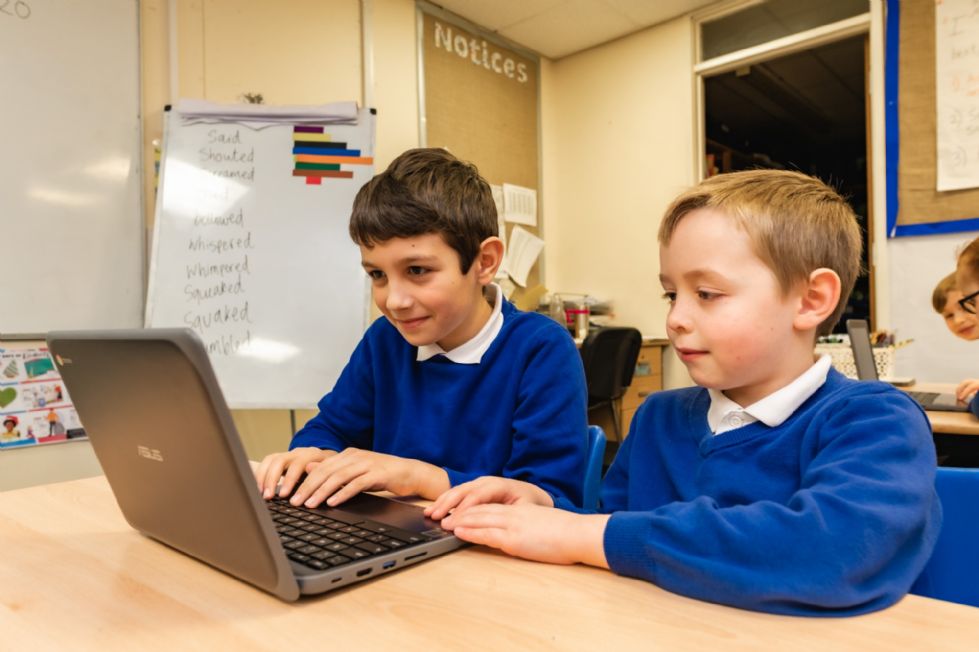
At Queensway School, we believe that learning about technology is essential for our children’s future. Computers and digital devices are part of everyday life and we want to make sure every child leaves our school with the skills and confidence to thrive in a world that is increasingly shaped by technology.
Early Years Foundation Stage
At Queensway, Computing in the Early Years is interwoven throughout daily practice and planning, through child-led play with adult interactions. Embedded within the daily routines, computing provision includes MiniMash on the iPads (accessed during continuous provision), an exposure to a range of technological devices in their role play area and programming of Beebots with simple algorithms.
Key Stage 1 and 2
We hope that our computing lessons will excite children about computing and support them to develop an enthusiasm and a belief that all people have technological ability. Every child has a weekly computing lesson where the children work in mixed groups, although some activities may be adapted to support children’s individual needs. We believe giving children this broad range of experiences helps prepare them for the digital world of the 21st century.
In addition to weekly computing lessons, other opportunities at Queensway include:
- Developing their ability to code through clubs
- Developing their exposure to different technology (e.g. robotics and VR) with outside organisations
- Assemblies and discrete sessions for computer safety
Purple Mash
Every class uses the Purple Mash of study to deliver the skills and computing objectives to fulfil the criteria of the Computing National Curriculum.
E-Safety
We teach e-safety right from the start of the year and regularly revisit through discrete sessions and fortnightly assemblies from Terms 3 to 6. Children learn how to use technology in a respectful and responsible way, how to protect their personal information online and what to do if they see or experience something that worries or concerns them. We know that online safety is just as important at home as it is in school, which is why we offer workshops and resources to help parents support their children’s use of technology at home. We also send home information via the school newsletter.
Assessment
Teachers are expected to assess the children at the end of each unit of work as in other non-core areas using assessment materials provided by Purple Mash.
Early Years Foundation Stage
Foundation Curriculum 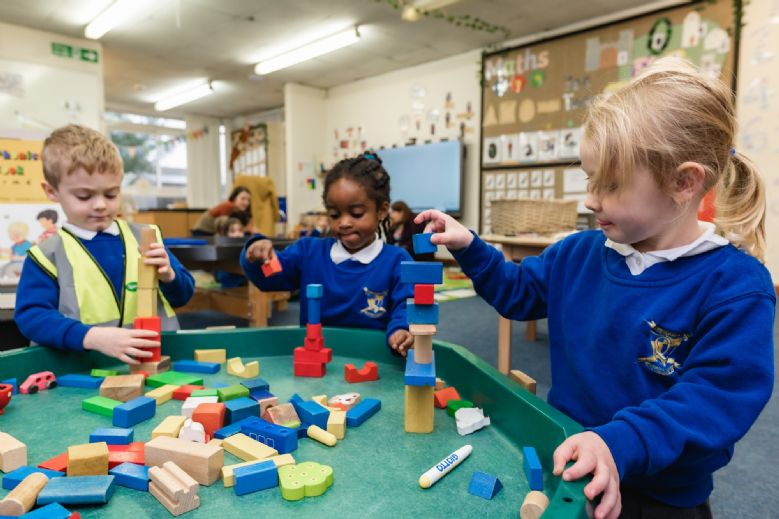
The Foundation Curriculum is based on the Department for Education and Skills document called the Early Years Foundation Stage. This sets out the knowledge, skills and understanding which young children should have acquired by the end of the academic year in which they reach the age of five.
The curriculum is organised into seven areas of learning:
- Personal, Social and Emotional
- Communication and Language
- Physical development
- Literacy
- Mathematical development
- Understanding the world
- Expressive Arts and Design
Personal, social and emotional learning is a very important aspect of children's development as it supports them learning how to work independently; how to share; how to behave appropriately and to generally develop skills that will help them to become effective learners.
These seven areas are used by teachers to plan the learning environment, activities and experiences for children in the foundation stage classes.
Click here for a Parents' Guide to the Early Years Foundation Stage Framework.
English
English is a core subject of the National Curriculum and a pre-requisite for educational and social progress as it underpins the work undertaken in all areas of the curriculum. At Queensway, we strive to ensure that all our pupils receive a well-rounded learning experience when reading, writing, speaking and listening which will equip them with the fundamental tools to achieve in school and beyond.

English as an Additional Language
At Queensway School, we aim to inspire every child to reach their full potential. For children learning English as an additional language (EAL), we use a range of teaching methods to help them access the full curriculum whilst developing their language skills. This includes using visual aids (such as pictures and diagrams), encouraging group discussions and drama, and supporting children with helpful phrases and models before they work on tasks.
We start by learning about each child’s home language and current proficiency in English. Teachers use a Hounslow framework to understand their needs and plan next steps. Most learning happens in the classroom, but children may also receive extra help in small groups or through one-to-one sessions – always with a focus on rich speaking and listening opportunities. Most EAL learners needing additional support do not have Special Educational Needs or Disabilities (SEND).
We want to ensure that all children are challenged and they receive the support they need. Parents are welcomed warmly and encouraged to work in partnership with the school. We provide clear communication and access translation support where possible.
In Early Years (Nursery and Reception), we give children lots of opportunities to build strong language skills in English, so they are ready for Year 1. If a child is struggling to learn English, we work with families to understand their development in their home (first) language to inform next steps. All of our children have access to high-quality teaching, and we value every language spoken in our school community.
Humanities (Geography, History & RE)
As part of our Humanities studies at Queensway, children will have opportunities to explore places with different geographical features and immerse themselves in the historical time periods to develop and enhance their understanding of what life was like during these times. In order to facilitate this, we arrange trips and experiences as well as inviting experts in these fields into school to share their knowledge and experience of the topic.
Geography
At Queensway School, we want every child to develop a strong understanding of the world around them—starting with their local area and expanding to the wider world. Geography helps children learn about different places, people, and environments, both in Britain and across the globe.
Early Years (Foundation Stage)
In the early years, Geography is part of a broader area called Understanding the World. Children explore:
- Their own lives and others through stories and discussions.
- The natural world by observing animals, plants, and landscapes.
- Different environments by comparing where they live to other places.
This learning happens through play, storytelling, and hands-on activities.

Key Stage 1
Children begin to learn about:
- Their local area and community.
- The countries of the UK and their capital cities.
- Addresses and maps, helping them understand where they live in relation to other places.
Key Stage 2
In Years 3 to 6, children learn about:
- Physical Geography – caves, coasts, and landscapes.
- Human impact – how people affect the environment and why it matters.
- Map skills – including reading symbols and using Ordnance Survey maps.
They also learn how Geography shapes life in different parts of the world.
Understanding Others
Geography helps children understand and respect different cultures and ways of life. We teach about:
- Habitats, climates, and how people adapt to their environments.
- Similarities and differences between places and people, helping children develop empathy and open-mindedness.
Learning Beyond the Classroom
We believe in hands-on learning. That’s why we:
- Organise local trips to places with interesting geography.
- Invite experts to speak with the children.
- Use real-world resources like maps, globes, and artefacts.
- Encourage children to bring in items from home related to their geography topics.
Assessment
Teachers are expected to assess the children at the end of each unit of work as in other non-core areas. These are completed using the Curriculum Overview Documents.
History
At Queensway School, we aim to spark curiosity and help children understand the past— both in Britain and around the world. Our History curriculum is designed to show how past events have shaped the way we live today, following national guidelines. By the time children leave Queensway, we want them to be thoughtful, informed, and curious historians—ready to understand the world and its diverse past.
Early Years (Foundation Stage)
In the early years, History falls under the “Understanding the World” area of learning. Through stories, plays and discussions, children will begin to grasp the idea of time and how things change. Children explore the past and the present – learning about their own lives and the lives of those around them. They will explore different ways of life and the changes over time that occur in the natural world.
Key Stage 1
Children will develop an awareness of the past, using words and phrases relating to the passing of time and are encouraged to ask and answer questions and explain their ideas using different sources. They will learn about changes within and beyond living memory and the lives of significant people who have made major contributions to society nationally and internationally. These topics help children connect the past to the present and understand how history influences our lives today.
Key Stage 2
Children will continue to develop an understanding of British, local and World History securing their knowledge of chronology. Teachers support the children to make connections and differences developing the use of key historical vocabulary. The children will be encouraged to ask questions while giving opportunities to give responses that are supported by relevant historical information.
In Key Stage 1 and 2, the teachers plan the units of study by using the school’s Long Term Plan and Curriculum Overview documents.
Bringing History to Life
To make history exciting and meaningful, we may organise school trips to museums or significant historical sites. Additionally, we may invite visitors to school to lead workshops. Teachers encourage children to bring in artefacts, books and items from home related to the topic being taught.
Assessment
When assessing History, teachers are expected to assess the children at the end of each unit of work as in other non-core areas. There are Curriculum Overview documents to support teachers’ assessments.
Religious Education

At Queensway School, we are committed to delivering a high-quality Religious Education for all of our learners. We celebrate and promote the diversity of both religious and non-religious beliefs within our school, community and wider world.
Early Years
RE is interwoven throughout the EYFS Curriculum through a mixture of adult and child-led learning experiences. The children explore special stories, important places and learn about why they are important to people, including themselves. They explore different celebrations and traditions and talk about how they are celebrated around the world.
Key Stage 1
In KS1, the children explore a variety of religions with a main focus on: Christianity, Judaism and Islam. Through their lessons, the children have the opportunity to explore a range of stories, celebrations, places of worship and religious individuals. The children also look at the point of view of people who do not follow faith throughout these topics. During their lessons, the children use art, writing, drama, reading and discussions to develop their understanding.
Key Stage 2
In KS2, the children continue to explore a variety of religions with a main focus on: Christianity, Judaism and Islam, along with Hinduism. They are also taught about Humanism: people who do not believe in God and instead rely on science to explain the way things are. During their learning, the children explore festivals, places of significance, the creation, holy books, significant stories as well as key themes between different religions. The children are encouraged to ask questions and begin to understand different religious and humanist responses. They also have lots of opportunities to reflect on their own beliefs and opinions as part of RE lessons.
NATRE Program
Every class uses the NATRE Program of study to deliver the skills and objectives to meet the Oxfordshire Agreed Syllabus. RE is delivered weekly or taught as part of a block or themed day.
Assessment
Teachers are expected to assess the children at the end of each unit of work as in other non-core areas using the resources provided by NATRE.
Maths
At Queensway School we follow a Maths mastery approach.
Foundation Stage
In Foundation, Maths is covered through our Mastering Number Programme. The shape and space provision is a separate plan following the school’s progression of skills document.
Key Stage 1 and 2
Teachers use the progression of skills documents to plan their Maths lessons. The weekly Maths lessons have an emphasis on grasping their understanding of the objective through a range of models and images. When planning, teachers look at what the children know previously and what they need to do to achieve the objectives. The calculation policy is used when planning and visual images are linked to the work in all year groups that the children are covering. To ensure that essential number skills are given priority, all teachers include an extra daily counting session in their timetables.
Using Resources
All classrooms have a range of practical resources to support the teaching of Maths. It is important that all children can use a range of resources and understand the limitations of these. These resources vary throughout the year groups, but every class should have access to Numicon, Cuisenaire, multilink and dienes, tens frames and Reknereks (a counting tool).
From Year 2 onwards we use TTRS to support children with their timetables. The children are given their own log-in information that they can use in school and at home.
We do not follow a scheme, but teachers use a range of resources which include Math’s No Problem, Inspire Maths, PowerMaths and White Rose.
Assessment
At the end of Reception, children are assessed against the seven areas of learning of which aspects of Maths is included. In Year 6, the children will participate in National Statutory Tests (SATS) for Maths. All children are assessed by teachers at three assessment points in the year (December, March and July). These assessments inform planning and teaching.



Modern Foreign Languages
At Queensway School we believe that the learning of a foreign language provides a valuable educational, social and cultural experience for our pupils. It helps them to develop communication skills, including key skills of speaking and listening and extends their knowledge of how language works. Learning another language gives children a new perspective on the world, encouraging them to understand their own cultures and those of others.
Teaching and Learning 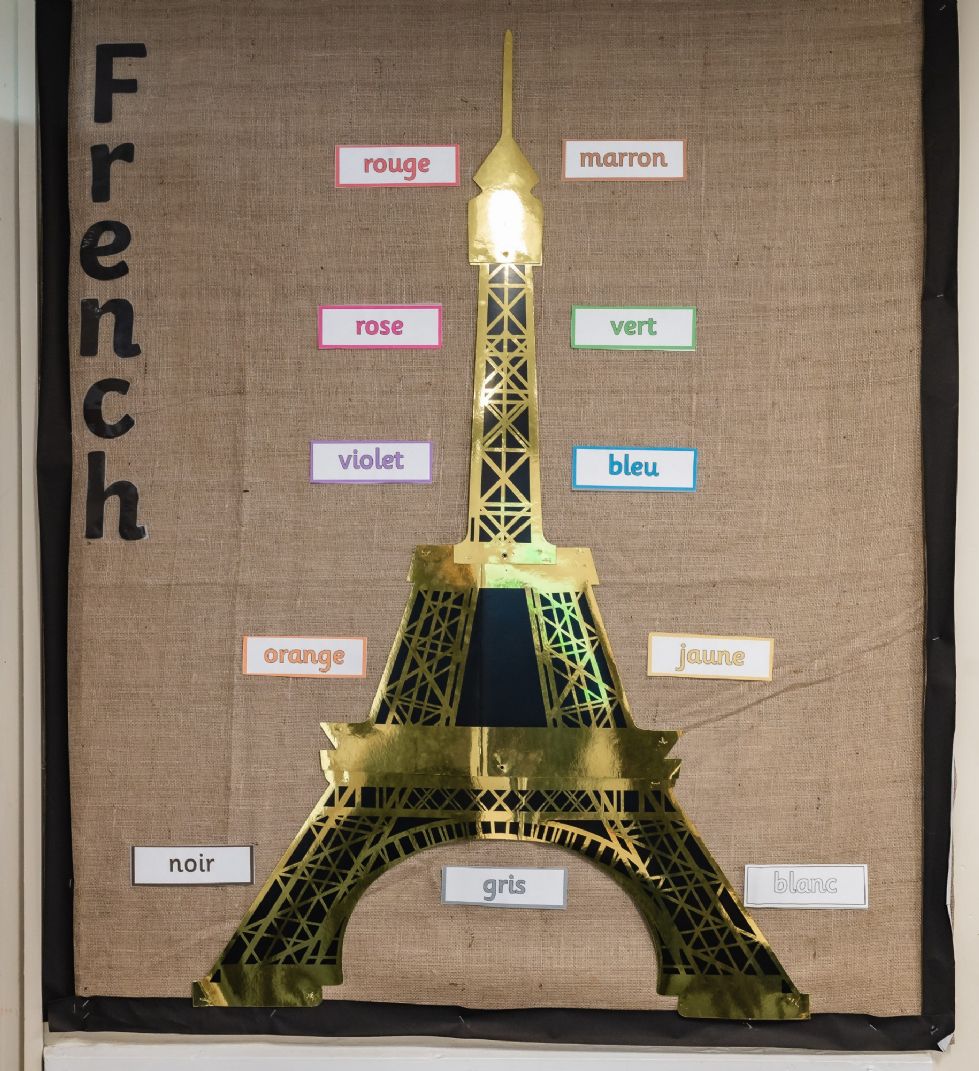
In Early Years, children are encouraged to share their home languages with the class. Simple greetings and songs, in languages that are relevant to the cohort, are taught through play and informal routines.
In Years 1 and 2, French is taught within the daily routines, such as when doing the register, or through songs and games as ‘Brain Break’ activities.
Children in Key Stage 2 at Queensway will all learn French on a weekly basis with their class teacher. The curriculum is taught through the Kapow Primary Scheme of Work. Teachers also follow the Queensway ‘on the boil’ document, to ensure vocabulary is practised throughout the week, not just in the lesson.
We focus on five main areas of the curriculum: Speaking and pronunciation, listening, reading and writing, grammar and intercultural understanding.
Assessment
Children will be assessed informally during the lessons, evaluating progress against the five key areas of curriculum, as listed above.
In Key Stage 2, the children’s skills and knowledge are assessed at the end of every term using the Kapow Assessment Grids.
Oracy

We support our children in developing the skills necessary to speak fluently and confidently to communicate their ideas and emotions. Through our exciting and engaging curriculum, we actively encourage our children to communicate their thoughts and ideas with explicit teaching of subject-specific vocabulary where appropriate. Children are given the opportunity to reflect on both their learning and feelings.
Our Oracy curriculum will enable children to:
- Speak with confidence, clarity and fluency.
- Recognise the value of listening; be confident in their own opinions and to be able to express them to others.
- Adapt their use of language for a range of different purposes and audiences.
- Sustain a logical argument and respond to others appropriately.
- Interpret and respond appropriately to a wide range of listening experiences.
- Be open-minded, to value the contribution of others and their views.
- Appreciate the diversity of languages, dialects and accents in the school and value the experience and contributions of children with a wide variety of linguistic backgrounds.
- Share their learning in engaging and informative ways.
Opportunities to develop skills in oracy include:
- Talking partners
- Paired and collaborative work
- Discussion in planning and preparing for writing
- Specific vocabulary teaching and application of essential vocabulary
- Reasoning and explanation within the curriculum
- Speaking in assemblies, Shared lessons or Class Exhibitions
- Listening to stories
- Working with children from other schools
Assessment
During the Early Years curriculum, children are assessed in this area within Birth to Five Matters and as part of the seven areas of learning for the statutory assessment at the end of the year. For Years 1 to 6, assessments related to oracy are made as part of assessments for curriculum areas. These assessments inform planning, teaching and learning.
Phonics
At Queensway School, Phonics is a vital part of our early literacy curriculum. We follow the Little Wandle Letters and Sounds programme, ensuring a systematic and engaging approach to teaching Phonics from Nursery through to Key Stage 2. Phonics is embedded in daily routines and is closely linked to reading and writing development.
Nursery and Early Years
In Nursery, children start their Phonics learning by developing their listening skills and becoming aware of different sounds around them. As they move into Reception, they begin learning the letters of the alphabet and the sounds they make. They also practise putting sounds together to read simple words and breaking words down to spell them.
Key Stage 1
Children continue to build on their Phonics knowledge. They learn more complex sounds and different ways to spell them. In the Summer Term of Year 1, they take part in a short Phonics screening check to see how well they can use their phonics skills. In Year 2, Phonics helps the children to become more confident and fluent readers and writers.
Key Stage 2
Some children may still need extra help with Phonics. We provide small group sessions to support them in building their reading confidence and fluency.
Reading and Application
Phonics is applied across the curriculum through guided reading, writing tasks, and 1:1 reading. Decodable books are carefully matched to each child’s phonics phase to promote confidence and independence.
Parental Engagement
We actively involve parents through workshops, meetings, and resources to support Phonics learning at home. There is also a parents’ area on the Little Wandle website (please see the link below).
Assessment
Teachers are expected to assess the children at the end of each short term using the Little Wandle assessment guidance.
Please find the link below for the Little Wandle Parents section where further information can be found about how to support your child at home.
PSHE

At Queensway School, PSHE (Personal, Social, Health and Education) is embedded in everything we do as we strive to promote pupils’ self-esteem and emotional well-being through our curriculum, school environment and ethos. We help pupils to form and maintain positive relationships based on respect for themselves and for others.
Children are taught key skills to develop their growth mindset and to be resilient and independent learners.
Foundation Stage, Key Stage 1 and 2
For the teaching of PSHE, we use a range of resources to plan and teach our PSHE curriculum. The main programme of study that we use is SCARF, which covers all the National Curriculum. The teaching is delivered through weekly lessons as well as circle time, themed assemblies and workshops, and is adapted to support the individual children’s needs. The 6 key themes are:
1. Being My Best: where children learn to develop skills in keeping healthy, developing a growth mindset (resilience), goal-setting and achievement
2. Me and My Relationships: this includes learning about their feelings and emotions and those of others, and conflict resolution and friendships
3. Valuing Difference: which has a focus on respectful relationships and British values
4. Keeping Myself Safe: children look at how to keep ourselves healthy and safe
5. Rights and Responsibilities: we learn about money, living the wider world and the environment
6. Growing and Changing: this unit teaches children about the human body, the changes that take place from birth to old age and how to keep themselves safe.
In addition to our weekly lessons, we also utilise age-appropriate workshops from a range of organisations, such as the NSPCC and Network Rail to further support children’s awareness and understanding of themselves, others, their environment and where to get help.
SCIB
We are also part of Safeguarding Children in Banbury (SCIB) which focuses on a curriculum designed specifically for the current issues that are affecting our local area, and these currently follow three themes: Protective behaviours, Positive relationships and Substance misuse.
Leadership opportunities
Alongside classroom PSHE teaching, we also encourage children to participate in leadership opportunities within the school to promote positive relationships, develop an understanding of the value of respect and allow for pupil voice, such as the elected school councillors, who actively promote PSHE values through their work across the school, Young Leaders and Breakfast Club Leaders.
Assessment
When assessing PSHE, teachers are expected to assess the children at the end of each unit of work as in other non-core areas. There are Curriculum Overview documents to support teachers’ assessments.
Reading
At Queensway School, we are committed to promoting reading for pleasure. To encourage this, we take part in World Book Day, organise class visits to the local library, buddy reading and also plan specific reading assemblies.
All children will have a variety of reading experiences; this includes weekly, small group guided reading lessons, 1:1 reading, children reading independently, reading when researching in lessons, hearing stories in class or in the story assemblies.
Early Years Foundation Stage
In the early stages of reading, the focus is on the development of phonic knowledge and the application of this in reading. Children’s knowledge of the alphabetical code (how letters or groups of letters represent the sounds of the language) supports their reading and writing. Early reading skills are explicitly taught with daily phonics sessions, where we follow the Little Wandle for Letters and Sounds programme.
In Nursery, children are introduced to phonics. The emphasis is to familiarise children to the sounds around them and ready to begin developing oral blending and segmenting skills. In Reception, the emphasis of phonics teaching will support children’s understanding that letters represent sounds in spoken words which will support their decoding (sounding out) of a word.
Key Stage 1
In Year 1, children continue to have daily phonics lessons. As children progress into Year 2, phonics teaching continues to ensure children’s fluent decoding of new words to support their reading. Teachers carefully select appropriate books for the children to read, which are closely matched to their developing phonic knowledge so that they can apply their learning, read independently, and feel like successful readers.
Key Stage 2
In KS2, teachers use a variety of books and texts, including books, magazines, newspaper articles, web pages, fiction and non-fiction books. We do not follow a particular reading scheme but use a variety of texts from different sources, selecting the most suitable. Guided Reading texts are mostly linked to the genre that the children are writing and are differentiated and chosen carefully to fulfil the learning outcomes.
Every year group has a recommended list of books to read at home that are organised into 3 sections: children who are less confident, children who are confident and children who are very confident. These can be found on the class pages on the school website and are shared at parents’ evenings.
Assessment
Teachers are expected to assess the children against reading objectives, focusing on word reading and reading comprehension skills. Children are formally assessed three times a year, using agreed objectives and our progression of skills document.

Science
At Queensway School, we believe that children learn best when they are curious and engaged. Our Science Curriculum is designed to spark that natural curiosity by encouraging children to explore, ask questions, and discover how the world works. Through fun, hands-on activities and investigations, we help children develop a love of science and build important thinking skills that will support their learning in all areas.
Key Stage 1 and 2
Our Science Curriculum is carefully planned to ensure children build their knowledge and understanding over time. Teachers use a long-term plan, based on the National Curriculum, to create detailed termly plans that meet the needs of their classes. In most cases, science topics change each term to keep learning fresh and engaging. However, some topics are taught over two terms, giving children the time to explore ideas in greater depth. Each week, children take part in well-sequenced science lessons that include opportunities to revisit and build on prior learning. Lessons are brought to life through a range of engaging resources, including photos, videos, hands-on investigations, and teacher demonstrations. Activities are adapted to suit different learning needs, ensuring all children are supported and challenged.
Science Investigations
At Queensway School, we regularly give children the chance to plan and carry out their own science investigations. This helps them build important scientific thinking skills—like asking questions, making predictions, and drawing conclusions—while deepening their understanding of the topic they are studying.
These investigations are often inspired by a story, real-life problem, photo, video or a ‘Concept Cartoon’, and encourage children to explore science through different types of enquiry. From Year 2 onwards, children use a special planning format called a ‘planning house’ to organise their ideas, and work together in groups, taking on different roles using role cards.
As part of the investigation process, children make predictions, record their results in tables or graphs, and write conclusions. They are also encouraged to talk about their thinking using our STEM sentence guides, which support them in developing scientific vocabulary and speaking in full, confident sentences.

Science in EYFS
In EYFS, Science is taught through the ‘Understanding of the World’ section of the Birth to 5 Curriculum and aims to develop children’s curiosity and passion for science and general team working skills. Science at Queensway is introduced indirectly through activities that encourage every child to explore, problem solve, observe, predict, think, make decisions and talk about the world around them. These activities are delivered in numerous ways, for example, through Continuous Provision, Enhanced Provision (‘Busy Birds’ time), Teacher-led inputs (whole class and in small groups) and Spontaneous Learning. This allows children who have a natural interest to develop their questions and observations through child-led learning, with adults following their lead and providing additional opportunities to explore ideas further. This may allow adults to begin to identify some children who might go on to be a most able child in Science, in addition to those who may need the greatest support.
At Queensway School, children in both Nursery and Reception are able to develop their scientific skills through exploring the following areas within the Foundation Stage provision:
- water tray
- sand pit
- bug hunts
- construction area, investigation station
- curiosity cube
- growing area
- mud kitchen
- sound station
- small world
- weather resources
- a wide variety of non-fiction texts available.
- Forest School
Working Walls
Where possible, there should be an area or display board which supports the children’s current science topic. This should display the current Knowledge Organiser as well as any key vocabulary that the children will be using in their lessons.
Science Day
Each year, the children take part in a Science Day aimed at raising the profile of science across the school. This is an opportunity to address any areas of science that as a school we might be working on for example, addressing misconceptions and developing the children’s working scientifically skills. Over the course of the day, the children will have the opportunity to take part in a range of science workshops, shows and experiences (chick hatching) to encourage the children’s passion for science. They might also have the opportunity to speak about or to real-life scientists.
Assessment
When assessing Science, teachers are expected to assess the children at the end of each unit of work as in other non-core areas. There are curriculum overview documents to support teachers’ assessments.
Special Educational Needs and Disabilities (SEND)
At Queensway School, we aim to ensure that every child feels valued, confident and successful at school, regardless of any special educational needs or disabilities (SEND). If a child finds learning challenging, we work closely with families to offer the right support at the right time. Most learning takes place in the classroom.
We use a step-by-step model that allows us to monitor each child’s progress and plan tailored support. This starts with high-quality teaching for all and may build up to more specific long-term support if required. If a child has very complex needs, they may have an Education, Health and Care Plan.
Our Inclusion Manager helps teachers to put the school’s SEND Policy into practice, and a dedicated school governor ensures that we are always reflecting and looking at ways to improve our provision. We work closely with professionals and actively welcome them into our school to advise and support as needed.
Children with SEND are encouraged to take part in every aspect of school life. We listen to our children, so we know what is working well for them – these insights help to shape our provision. We value working collaboratively with parents / carers. We hold regular meetings with families to set goals and celebrate progress. We aim to identify needs early, so that all children can achieve well. This includes early intervention for our youngest children in Nursery and Reception, to enable them to have a positive start at school and a successful transition to Key Stage 1.
Sports & PE
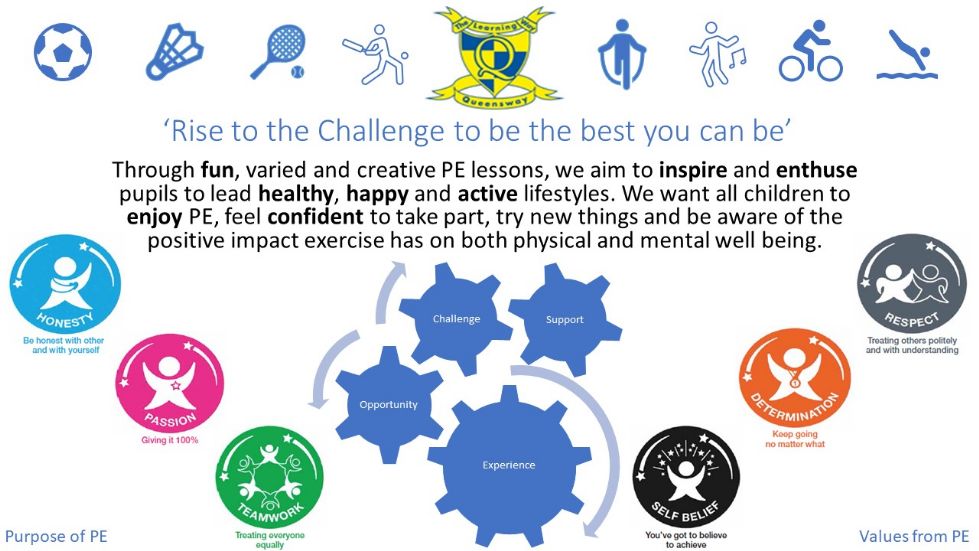
At Queensway School, our PE curriculum aims to ensure that all pupils develop the core skills and confidence to take part in a wide range of physical activities, by providing children with a chance to enjoy a range of different sports. Children learn to develop the important qualities of discipline, resilience, communication, teamwork, and ambition, leading to improved concentration, attitude, and academic work.
For PE, we follow the scheme ‘Get Set 4 PE’ where we use and adapt the lesson plans and resources to support our children and their needs. This scheme follows a clear progression from basic core skills e.g. catching and throwing to whole game skills.
PE in EYFS
Children in EYFS at Queensway take part physical activity in a variety of ways, which is part of the ‘physical development’ section of the EYFS framework. Children have daily access to outdoor areas, where they experience a range of activities, such as riding bikes, climbing on a climbing frame and ball skills. Children in the EYFS also attend forest school sessions where they can develop their fine and gross motor skills in a different environment using various materials not available in the classroom.
Children develop their fine motor skills, through activities such as threading, scissor work, holding pencils and hammering. There is always a variety of activities available to the children both in the continuous and enhanced provision that allow them to practice the fine motor skills needed for writing. In Nursery, children take part in ‘dough disco’ and ‘squiggle while you wiggle’. In Reception, the children also take part in a weekly PE lesson.
The aim of PE in the EYFS is for children to feel confident to try new activities, developing their independence and resilience, whilst facing new challenges. In doing so, children will also be learning how to take turns and work cooperatively. PE and physical development also allow the children to develop the characteristics of effective learning – playing and exploring, active learning and creating and thinking critically.
PE in KS1 and KS2
Children at Queensway School receive two hours of physical education per week (indoor and outdoor). As well as these lessons, all children participate in physical activity throughout the day, including active brain breaks using active videos, active play at break and lunch with the support of teaching assistants and playground leaders. Years one to six complete the weekly mile. Additionally, weather permitting, After School Club include active sessions in their activities.
Children in Year 5 also participate in three half terms of weekly swimming lessons (classes swap after three half terms), which are facilitated by qualified swimming instructors at Queensway School, as well as Spiceball Leisure Centre. Our mission is to enable these pupils to have continuous weekly lessons in order to meet national curriculum expectations. In particular, the government wants pupils to be able to:
- Swim competently, confidently and proficiently over a distance of at least 25 metres.
- Use a range of strokes effectively (e.g. front crawl, backstroke and breaststroke).
- Perform safe self-rescue in different water-based situations.
Our PE curriculum will be inclusive and ensure that pupils of all abilities access the range of activities we offer and that they are physically active for sustained periods of time to encourage them to lead healthy, active lives.
NOSPP
We work in partnership with NOSPP (North Oxfordshire School Sport Partnership), who provide opportunities for pupils to participate in competitive sports and activities both in and beyond the curriculum. This will mean that pupils can participate in all the four levels of competitive sport – competition in school, between schools, at county/area level and at national level. Through the NOSSP partnership, staff have a chance to have continued professional development through working with a PE mentor.
Sports Premium
Every year the Government provides schools with an amount of money dedicated to providing children with high-quality PE and Sports opportunities. We are committed to using this resource in developing high-quality PE lessons, alongside greater opportunities for sporting competitions and clubs for all our young people. Click here for link to Sports Premium document
Keeping Active Links
Both Sport England and the Youth Sports Trust have both launched web-pages dedicated to ideas for getting active while at home and helping children to meet the chief medical officer’s recommendation of at least 60 minutes of daily activity.
https://www.sportengland.org/news/how-stay-active-while-youre-home
https://www.youthsporttrust.org/free-home-learning-resources
In addition, there are lots of other FREE resources
BBC super movers
https://www.bbc.co.uk/teach/supermovers
Joe Wicks Body Coach (Kids workout)
https://www.youtube.com/results?search_query=joe+wicks+kids+workout
Just Dance
https://www.youtube.com/results?search_query=just+dance+kids
Cosmic Kids Yoga
https://www.youtube.com/user/CosmicKidsYoga
Go Noodle
https://www.youtube.com/results?search_query=go+noodles+for+kids
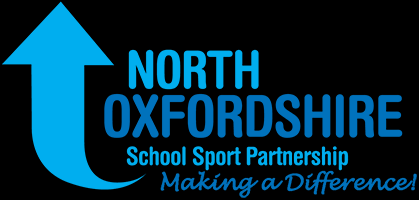
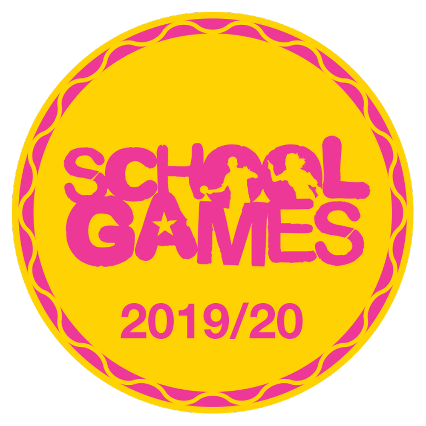
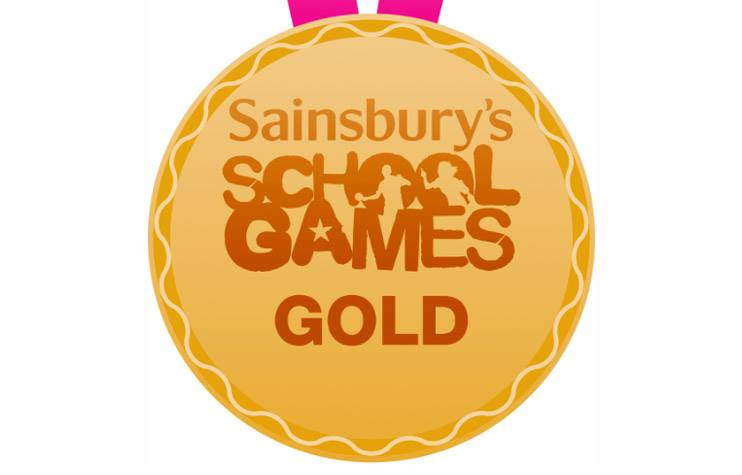
The Arts
Art
At Queensway School, it is our aim for the children to be creative and imaginative in their Artwork. We strive for the children to be skilled at using colour, texture, sculpture, shape, line and tone. We aim to immerse the children in the work of various Artists and their styles so that they can learn how to create art in a similar style.
How this looks in practice:
- Teachers use the Long Term Plan and Curriculum Overview documents to plan units of work to ensure that the children’s skills are developing at an age-appropriate rate in; colour, texture, sculpture, shape, line and tone.
- Art is taught on alternate terms to Design and Technology.
Using sketchbooks
Each child from Year 1 has a sketchbook in which their best quality artwork is kept. This is a book that moves with them throughout school and shows their journey through the skills and techniques that they develop.
Displaying children’s work
We believe that it is important that all children should be able to feel as though their work is valued. Children’s finished artwork will be displayed in their classroom, shared during Class Assemblies or Shared Lessons and at Class Exhibitions.
Assessment
When assessing Art, teachers are expected to assess the children at the end of each unit of work, as in other non-core areas. There are Curriculum Overview documents to support teacher’s assessments.



DT
At Queensway School, we aim for children to become creative problem-solvers who are confident in designing, making and evaluating products. Through purposeful and planned learning opportunities, as children go through school, they will be able to make cross-curricular links as well as acquire skills and subject knowledge to gain an understanding of a design process, the relevance of evaluations and skills needed throughout life. Our teaching is grounded in real-life contexts, helping children to understand how D&T is used in the wider world.
How this looks in practice:
- Teachers use the Long Term Plan and Curriculum Overview documents to plan D&T units of work that build on skills in designing, making, evaluating, and using technical knowledge, including mechanisms, structures, textiles, food and electronics (KS2).
- In the Early Years Foundation Stage (EYFS), children explore Design and Technology through imaginative play, construction activities, and hands-on exploration of materials and tools as part of Expressive Arts and Design and Understanding the World.
- Design and Technology is taught in alternate terms to Art.
Design Process and Using Books
Children follow a design-make-evaluate process. They begin by exploring existing products, generating their own design ideas and planning their creations. During the making phase, they use age-appropriate tools and materials to bring their ideas to life. They then reflect on their finished products, thinking critically about what worked well and what could be improved. Children do this work in Design Technology books from Years 1-6.
Food Technology
As part of our D&T curriculum, children are taught about food and nutrition. They learn basic cooking skills, the principles of a healthy diet and how to prepare simple dishes safely and hygienically.
Displaying and Celebrating Work
Children’s D&T projects are celebrated and valued throughout the school. Final pieces may be displayed in classrooms, shared in Class Assemblies or Exhibitions or used for practical purposes around the school.
Assessment
As with other non-core subjects, teachers assess children’s progress in D&T at the end of each unit. Assessments are supported by Curriculum Overview documents and are based on how well children have met the objectives for designing, making and evaluating.
Music
At Queensway School, Music in the Early Years is interwoven throughout daily practice and planning, both in adult-led input and child-led play. Embedded within the daily routines, musical moments may include singing songs, games and movement, storytelling and role play. Additionally, there may be instruments available for play-based activities.
Key Stage 1 and 2
We hope that our music lessons will excite children about music and support them to develop an enthusiasm and a belief that all people have musical ability. Every child has a weekly music lesson where the children work in mixed groups, although some activities may be adapted to support children’s individual needs.
In addition to the weekly music lessons, other opportunities at Queensway include:
- Learning a musical instrument through Music For Schools tuition
- Developing their ability to play a musical instrument through clubs
- Developing their singing through participating in the School Choir or Singing Club
- Having the opportunity to perform in public, such as taking part in the Children Singing For Children concert
- Participating in Year 2 nativity
- Performing songs or musical compositions in assemblies or year group exhibitions
- Taking part in a weekly Singing Assembly
Charanga Program
Every class uses the Charanga Program of study to deliver the skills and musical objectives to fulfil the criteria of the Music National Curriculum.
Composition
Each year, the children also have the opportunity to participate in activities planned to develop their composition skills. In Key Stage One, teachers use bespoke planning to introduce and develop key skills in composition. In Key Stage 2, teachers use resources from the ‘BBC Ten Pieces'.
Assessment
Teachers are expected to assess the children at the end of each unit of work, as in other non-core areas. There are suggestions for activities to assess children’s ability within the Charanga units and a progression of skills document to support teachers in the composition units.
Click here for a link to the DFE Music plan.

Arts Mark Award
We are thrilled to say that we have been awarded the Silver Artsmark Award. The children and staff have been working hard in all areas of The Arts (Art, DT, Dance and Music) over the last two years and we have been recognised for that! The children took part in lots of cross-curricular learning, including Drama workshops, Music lessons and Art lessons, all linked through a text. It is a fantastic achievement, and we are looking forward to sharing more of the work in the Arts with each other and you!
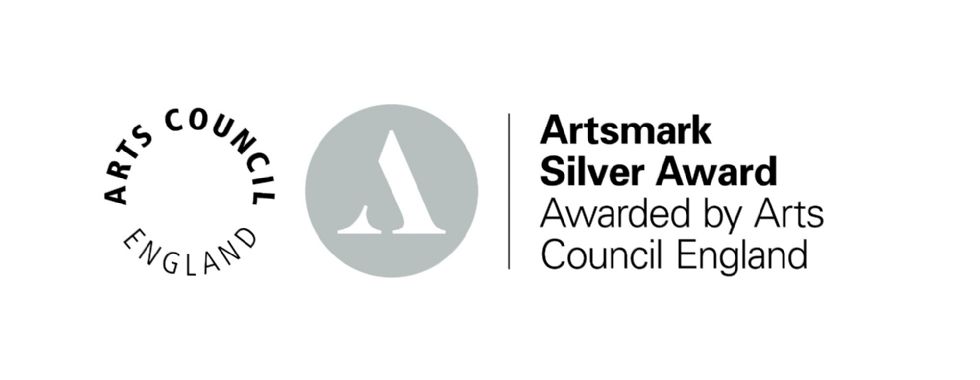
Writing
At Queensway School, we aim to inspire the children to be excited about their writing and achieve their full potential. As staff, we hope to pass on our enthusiasm and help the children to believe that they are valued writers.
Early Years
In the Foundation Stage, the focus of writing initially is giving meaning to marks and then moves on to letter formation and the application of phonics. Writing is taught in two ways - through literacy and phonics lessons that have a specific focus and through “continuous provision” where children write independently using a variety of media with activities linked to a theme or personal interests. Opportunities for early mark making and writing are planned through a mix of adult-led and child-led activities.
Key Stage 1
In Key Stage 1, teachers use the ‘Talk For Writing’ approach where the writing is taught through learning a text, creating a text map and then teaching modelling. There is always a chance for the children to add their own ideas through innovating their writing and teachers provide opportunities for using the children’s knowledge of a genre and its features through cross-curricular writing. Children are encouraged to apply their phonic knowledge and the grammar teaching.
Key Stage 2
In Key Stage 2, our approach to writing follows a sequence of learning: exploring the text (which is also linked with guided reading), learning about and practising the grammatical features, looking at the content and the style of language within a text, planning for writing, watching teachers modelling the writing and then the children write independently. Spelling and grammar are taught in specific lessons but will be applied through the children's independent writing. Children are encouraged to plan, draft and edit their work as part of the writing process.
Assessment
Teachers are expected to assess the children in handwriting, composition, spelling and grammar. The children are formally assessed three times a year, assessed using year group objectives and our progression of skills document.



